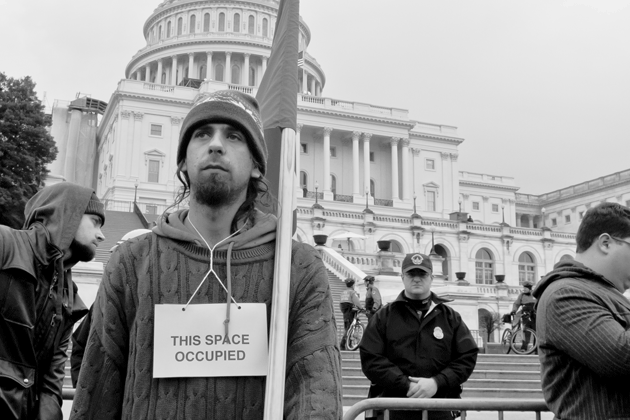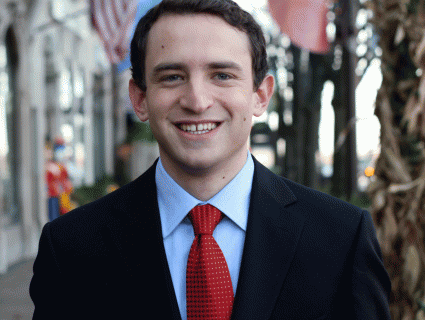 An Occupy protest on Capitol Hill: SOBPhotography/Flickr
An Occupy protest on Capitol Hill: SOBPhotography/Flickr
Unlike the tea party, the Occupy movement hasn’t involved itself much in elections. But that hasn’t stopped a slew of progressives and political outsiders from capitalizing on the movement’s energy. Here’s a rundown of 10 electable House and Senate hopefuls who, one way or another, have made Occupy part of their campaigns:
Hakeem Jeffries (New York): “Income inequality is worse now that it has been since prior to the Great Depression,” the state assemblyman said during a passionate speech at an Occupy rally in Brooklyn this fall. In January, Jeffries announced that he’d run for Congress in New York’s Tenth Congressional District against 15-term incumbent Ed Towns, who’d angered labor unions when he cast the deciding vote in 2005 for the Central American Free Trade Agreement. Since then, Jeffries has picked up endorsements in the Brooklyn district from prominent unions such as the Communications Workers of America.
Prospects: Fair. Jeffries’ success could hinge on stopping the Tenth District from being redrawn to exclude his state assembly district, where he’s popular.
Lori Saldaña (California): “Lori Saldaña has leapt headlong into the Occupy movement,” writes the San Diego Union-Tribune. While that may be a bit of an overstatement, the Democratic former assemblywoman certainly caters to the cause with her campaign slogan: “Fighting for America’s middle class.” In January, she joined a rally organized by Occupy the Courts in protest of Supreme Court rulings that give corporations the rights of people.
Prospects: Good. A recent poll ranks her as the frontrunner in the primary and just six points behind incumbent Republican Rep. Brian Bilbray. But an independent who may enter the fray could strip away some of her supporters.
Alan Grayson (Florida): Nobody running for Congress has done more to side with Occupy Wall Street than the outspoken former congressman from Orlando. In October on Real Time with Bill Maher, Grayson destroyed conservative pundit PJ O’Rourke with a fiery defense of the movement. A clip from the segment now features in an Occupy-themed video that automatically plays on the Grayson campaign’s homepage. Beloved by progressives for his voting record and willingness to go on the attack—he likened Dick Cheney a blood-sucking vampire and summed up Republicans’ health care plan as “die quickly”—Grayson lost his reelection bid in 2010 but is attempting a comeback in Florida’s new Democratic-leaning 9th Congressional District.
Prospects: Excellent. He’s one of only three candidates whom the DCCC has named “Majority Makers,” meaning that their races are top priorities.
Norman Solomon (California): A well-known political author and activist, Solomon is a feisty underdog in a race to fill an open congressional seat that includes ultra-liberal Marin County and parts of Northern California’s pot-friendly Emerald Triangle. He has visited Occupy protests in seven towns across the district, making the movement a central focus of his campaign. “From Manhattan to Marin County and beyond people are anguished, disgusted, angry, and—increasingly—determined,” Solomon wrote on his website after attending an Occupy protest in San Rafael. He pledges not to accept any donations from corporate political action committees, arguing that “corporate money is habit-forming.”
Prospects: Fair to Good. Though his campaign has 850 volunteers and has landed support from Democracy for America and celebrities such as Phil Donohue and Sean Penn, October polls put him between 5 and 13 points behind a less liberal Democrat.
Eric Griego (New Mexico): One of the most progressive members of the state senate, Griego gave a speech at Occupy Santa Fe this fall denouncing corporate personhood. He’s also one of a handful of elected officials who signed Occupy Santa Fe’s “99 Pledge,” a commitment to vote for rigorous campaign finance reform.
Prospects: Good. Griego’s centrist primary challenger for the vacant seat, former Albuquerque Mayor Marty Chavez, is tainted by the arraignment* of his live-in girlfriend on embezzlement charges. But another contender in the race could divide the progressive vote to Chavez’s advantage.
Elizabeth Warren (Massachusetts): In an interview this fall with the Daily Beast, the Harvard Law prof took credit for creating “much of the intellectual foundation” for Occupy Wall Street. (Read our profile of Warren here.) She didn’t back down when Republicans tried to tie her to the movement’s extremist factions: “She understands why people are so angry and why they are taking the fight to the street,” her spokesperson told the Washington Post, adding that Warren will “take the fight to the United States Senate.”
Prospects: Good. The latest poll shows Republican incumbent Scott Brown breaking away with 49 percent of the vote to Warren’s 41 percent, but she’s still within striking distance in what’s expected to be a close race.
Tammy Baldwin (Wisconsin): In 2010, the National Journal called Baldwin the most liberal member of the House. She earned kudos in November from the Occupy crowd for sponsoring a resolution opposing any government deal that grants criminal immunity to banks. “When the conventional tools for expressing yourself…are closed and your voice is cut off,” Baldwin has said of Occupy Wall Street, “what else is left but to use the possibility of standing on a soap box and screaming to anyone who will listen?”
Prospects: Excellent. She is the likely Democratic nominee to replace the retiring Sen. Herb Kohl.
Wenona Benally Baldenegro (Arizona): Two years after Democratic Rep. Ann Kirkpatrick lost her Arizona congressional seat to tea party Republican Paul Gosar, she’s campaigning to retake it. But she could lose in the primary to Baldenegro, who blames her for alienating supporters with votes against the pro-union Employee Free Choice Act and for job-killing foreign trade bills. A Harvard Law grad who’d be the nation’s first Native American congresswoman if elected, Baldenegro has renounced campaign donations from corporate lobbyists and supports taxing the rich and public financing for elections. In late October, she joined six other progressive House candidates—including Griego, Sheyman, and Saldaña—to hand-deliver House Speaker John Boehner (R-Ohio) 35,000 signatures from people who “stand with the 99 percent.”
Prospects: Fair. Though Kirkpatrick sports name recognition and support from the Democratic establishment, Baldenegro has the endorsement of progressive Congressman Raul Grijalva (D-Ariz). More important, the district’s boundaries were redrawn last year to include Navajo strongholds that will back her.
Hansen Clarke (Michigan): Sponsoring legislation to forgive student debt has made the Detroit Congressman a hero to thousands of college kids involved with Occupy. During the movement’s March 1 “Occupy Education” protests in Washington, DC, activists relayed a statement from Clarke using the famous people’s mic: “Young people in America should be able to pursue higher education to achieve their dreams without worrying that this decision will devastate their financial futures.”
Prospects: Good. Though he’s running against another incumbent Congressman in a consolidated district, Clarke has an early cash advantage and growing list of union endorsements.
Ilya Sheyman (Illinois): A 25-year-old former national mobilization director for MoveOn.org, Sheyman has made Occupy’s message of shared prosperity a key theme of his campaign. “Right now, the wealthiest 400 Americans in this country have as much wealth as the bottom 150 million,” he said during a Democratic primary debate this fall. “We are seeing those at the top get wealthier and wealthier while the middle class gets squeezed. So yes, I am a supporter of Occupy Wall Street.”
Prospects: Good. Read my companion piece on how his March 20 primary race could be a bellwether for progressives in 2012.
UPDATE: Many people have contacted me with the names of other Occupy-friendly candidates. If you have suggestions for other races to check out, leave them in the comments or send them to @JoshHarkinson on Twitter, where I’ve been RTing them.
*Correction: An earlier version of this story reported that Chavez’s girlfriend had been convicted on embezzlement charges. She has been arraigned on those charges but not convicted. Mother Jones regrets the error.












